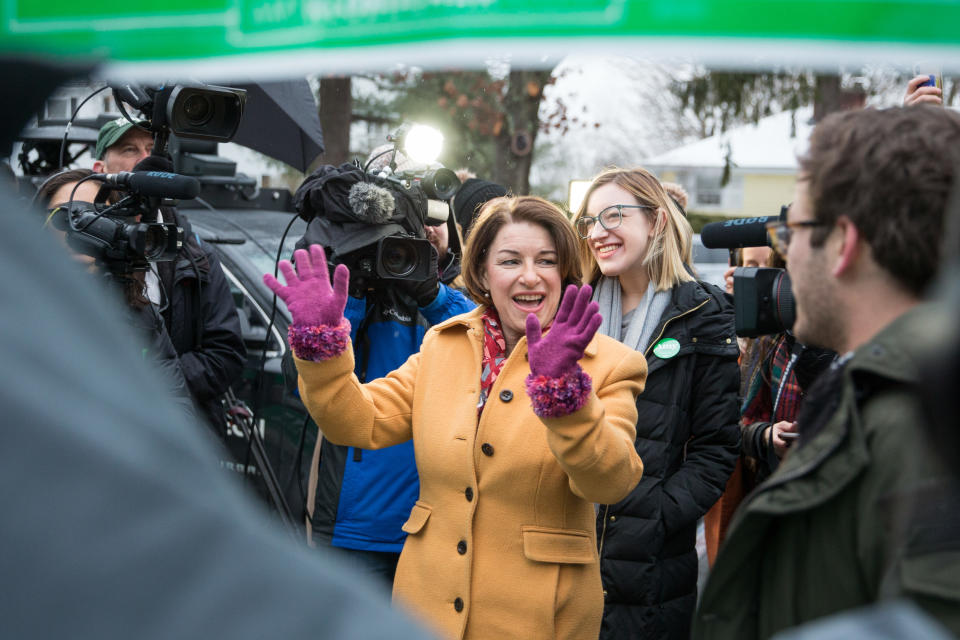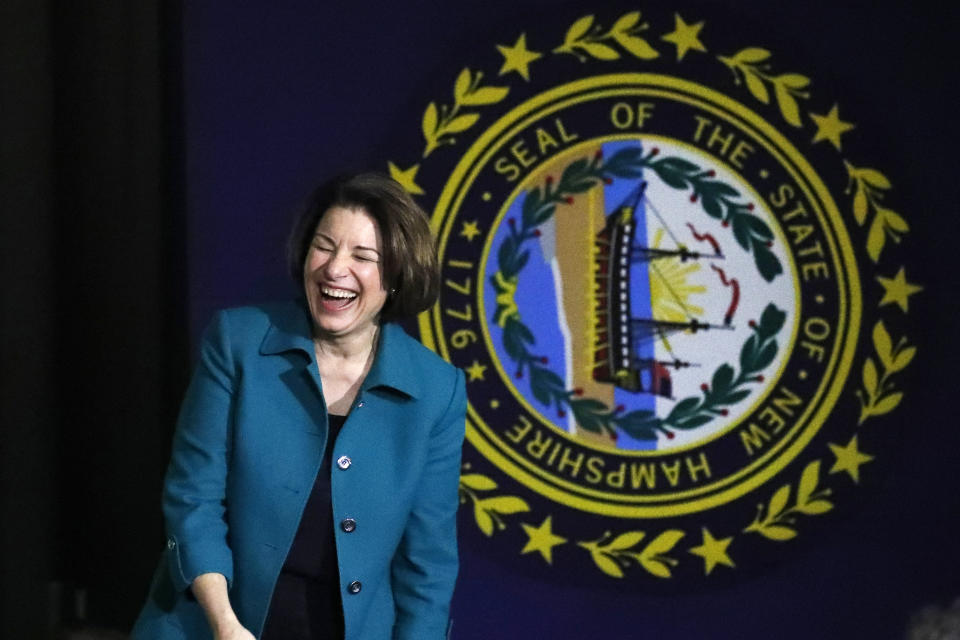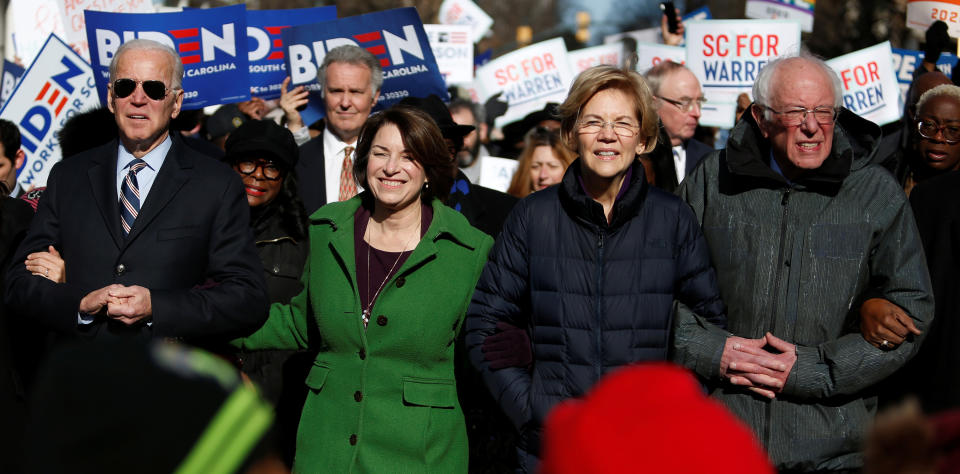Riding wave of momentum, Klobuchar lands in 3rd place in New Hampshire primary
- Oops!Something went wrong.Please try again later.
CONCORD, N.H. — Amy Klobuchar rode a late-breaking wave of momentum over the past week to finish third in the New Hampshire primary Tuesday night, vaulting from relative obscurity into contention for the Democratic nomination for president.
Klobuchar, a 59-year-old U.S. senator from Minnesota, received 20 percent of the vote with 90 percent of the vote counted, behind Sen. Bernie Sanders at 26 percent, and Pete Buttigieg at 24 percent.
It was a stunning turn of events for Klobuchar, who finished in fifth place in the Iowa caucuses and just a week ago was in fifth place in the polling of New Hampshire voters.
“Hello America. I’m Amy Klobuchar, and I will beat Donald Trump,” Klobuchar said, introducing herself to the nation in front of a jubilant crowd of supporters at a hotel here after the results were announced. “Everyone had counted us out. … I came back and we delivered.”
“We are taking the message of unity to the country, because we know in our hearts that in a democracy it is not about the loudest voice or the biggest bank account. It is about the best idea and the person who can turn those ideas into action,” Klobuchar said.
She repeatedly referenced the words “grit” and “resilience.” She connected her hardscrabble family story to her ability to defy predictions by becoming the first woman from Minnesota elected to the U.S. Senate, and said this tough spirit was at the heart of what makes America great.

“My story is nothing compared to the resilience that I’ve seen all over this country,” she said. “America deserves a president who is as resilient as her people.”
And Klobuchar explicitly referenced her desire to receive support from independents and Republicans in addition to Democrats, and promised to unite the country after four years of President Trump’s tumultuous and divisive presidency.
“Donald Trump’s worst nightmare is that the people in the middle, the people who have had enough of the name-calling and the mudslinging, have someone to vote for in November,” she said.
Klobuchar’s surge appeared to come at the cost of support for other candidates who had looked much stronger a few months ago: Sen. Elizabeth Warren, D-Mass., who had only 9 percent, and former Vice President Joe Biden, who had 8.5 percent.
“I made up my mind in the voting booth,” said Susan Zlotnick-Hale, a retired physician. “The focus has to be on getting who’s in the White House out of the White House.”
Zlotnick-Hale chose Klobuchar, she said, because “she’s competent, she has proven herself as a senator and a prosecutor, and believe it or not, yes, she’s a woman.”
Klobuchar had always seen an opportunity in New Hampshire, but a confluence of events came together more favorably for her than she could have imagined.
Unlike in Iowa, when the Democratic presidential candidates debated each other two weeks before voters went to the caucuses, the debate in New Hampshire came just a few days before the primary.
Klobuchar had been confident in her debate performances in the past, and was waiting for a moment when one of them could have a real impact on her chances.

New Hampshire provided the perfect storm. The debate went exceptionally well for her. Her closing statement, in which she spoke directly to voters and showed some emotion, appeared to resonate.
“If you have trouble stretching your paycheck to pay for that rent. I know you and I will fight for you. If you have trouble deciding if you’re going to pay for your childcare or your long-term care, I know you and I will fight for you,” Klobuchar said.
A senior campaign adviser to Klobuchar told Yahoo News they had raised $5 million since the Friday debate. “It can’t be overstated how important the debate was,” the Klobuchar adviser said.
Meanwhile, Biden, coming off a fourth place finish in Iowa, essentially conceded New Hampshire before it was even close to over, saying in the opening moments of the debate that he expected to “take a hit” in the voting.
And while the Iowa result elevated Sanders and Buttigieg, it still left many Democrats — at least in New Hampshire — casting around for an option that was not as far left as Sanders, and with more experience than Buttigieg.
Klobuchar, rather than Warren, was the beneficiary, indicating a preference in the Granite State for a moderate Midwestern rather than a Northeast liberal. Klobuchar’s finish was all the more impressive given that Warren had a significant organizing presence in this state, in large part because of her ability to draw volunteers from her neighboring home state.
New Hampshire has a unique system, a semi-open primary in which over 400,000 voters out of 980,720 are undeclared and can vote in either party primary. The absence of a Republican primary pushed undeclared voters who might have otherwise voted in a GOP primary into the Democratic contest, which is likely to have played to Klobuchar’s advantage as well.

The question now for Klobuchar is how she will weather the attacks on her record as a prosecutor in Hennepin County starting in 1998. Those began in earnest even before the vote was counted in New Hampshire, during an appearance by Klobuchar on ABC’s “The View.”
Sunny Hostin, one of the co-hosts on “The View,” pressed Klobuchar about her role in the 2002 prosecution of Myon Burrell, a 16-year old African-American teenage boy who was sentenced to life in prison for shooting an 11-year old girl.
“It is one of the most flawed investigations and prosecutions that I think I have ever seen,” Hostin told Klobuchar.
Klobuchar said that “all of the evidence needs to be immediately reviewed in that case,” but Hostin pressed her on what she will do to make that happen.
And that issue will be of intense interest to voters in the next two states in this process: Nevada and South Carolina.
South Carolina, in particular, has a huge number of African-Americans in its Democratic electorate. And much has been made within the Democratic Party of the fact that the first two contests in Iowa and New Hampshire have shaped the race without any voting in states with any significant minority populations.
“Each time I come to New Hampshire, I say, yes this is very much America, but it’s different. You got a whole lot of beautiful vanilla brothers and sisters in New Hampshire. You don’t see too many Jamals and Latishas,” said Cornel West, a philosophy professor at Harvard who is a prominent surrogate for Sanders, at a get-out-the-vote event Tuesday morning.
On CNN, former South Carolina state Sen. Bakari Sellers urged pundits to “slow down and let some black people vote.”

Buttigieg has his own problems with minority voters. His support from African-Americans has been abysmal, probably due in part to issues with the black community in South Bend.
But Klobuchar scored very well in exit polls among voters who said their highest priority is a candidate who can unite the county, and who can beat President Trump. She led Buttigieg 31 percent to 29 percent on who can unite the country, and trailed him 21 percent to 27 percent on who can beat Trump.
Warren’s decline may give Sanders an edge in consolidating the left wing of the party, but there may be a significant number of Warren voters who switch to Klobuchar or Buttigieg as well. Biden’s voters are probably more likely to move to Klobuchar or Buttigieg.
And while Klobuchar and Buttigieg battle it out, they have to worry also about the billionaire hedge fund manager Tom Steyer and even more so about former New York City Mayor Michael Bloomberg — also a billionaire — who may see those candidates as small obstacles in the path to the nomination.
Michael Filler, a 63-year-old retired school psychologist, was at the Klobuchar primary night event on Tuesday evening. He had chosen to support her back in November but told Yahoo News he had been “discouraged” until the last few days.
“The surge is pretty surprising,” he said. “I really think it was that darn debate performance.”
Filler said he worries about Klobuchar’s ability to keep her campaign financed, but that if she can get a look from the next few states, she has a shot at winning the nomination. He said he felt pretty good about Klobuchar’s ability to stand toe to toe with Trump in a debate.
“It was easy to do with Clinton, because nobody liked her anyways,” Filler said. “But if he did it with Amy, she’s likable, and she’s got a sense of humor.”
_____
Read more from Yahoo News:




